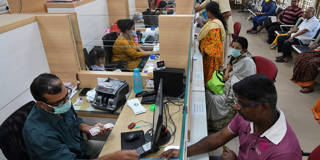In 2005, the Reserve Bank of India incentivized the opening of new bank branches in underserved districts throughout the country. Banks stimulated local economic activity, offered banking services – including health insurance – to households, and provided credit to hospitals, while healthcare demand and supply increased, and households showed improved health outcomes.
LONDON – At least half of the global population lacks access to essential health services, and health-care expenses push almost 100 million people into extreme poverty each year. How scarce resources are distributed should matter, and there are good reasons to believe that finance could play a crucial role in addressing this challenge. More than 60 countries have launched national financial-inclusion strategies, and academic research is keen on understanding their impact.
Until recently, there was no evidence that finance could make a significant difference for health. Randomized controlled trials that offered households financial products such as savings accounts, credit, and health insurance found no effects. But, crucially, these studies did not examine important long-term and large-scale aspects of banking, nor did they account for the financial products and services offered to businesses and health-care providers.
In a recent study, I used a natural experiment that introduced variation in bank presence in India to assess the effects of improving financial inclusion nationwide, over ten years, and on different actors in the market. In contrast to previous research, I found substantial improvements in households’ health.

LONDON – At least half of the global population lacks access to essential health services, and health-care expenses push almost 100 million people into extreme poverty each year. How scarce resources are distributed should matter, and there are good reasons to believe that finance could play a crucial role in addressing this challenge. More than 60 countries have launched national financial-inclusion strategies, and academic research is keen on understanding their impact.
Until recently, there was no evidence that finance could make a significant difference for health. Randomized controlled trials that offered households financial products such as savings accounts, credit, and health insurance found no effects. But, crucially, these studies did not examine important long-term and large-scale aspects of banking, nor did they account for the financial products and services offered to businesses and health-care providers.
In a recent study, I used a natural experiment that introduced variation in bank presence in India to assess the effects of improving financial inclusion nationwide, over ten years, and on different actors in the market. In contrast to previous research, I found substantial improvements in households’ health.